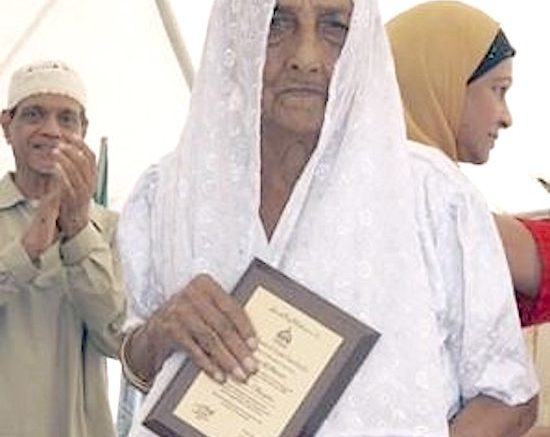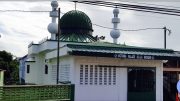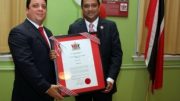The Indian Arrival Day celebrations started at 10 am and included a range of activities. There were several booths selling traditional East Indian clothing, food, ornaments and other items. ASJA primary and secondary schools were also given the opportunity to display art and craft items related to the arrival of the Indian community in TT. Atiman Ramjohn, who is 104, received a special award for being one of the eldest persons in the Indian community.
President general of ASJA Haji Yacoob Ali said the celebrations were also an opportunity to “pay tribute to those who came,” and commended the harmonious living of the major religious groups in the country.

Sheikh Majid Ali as he addresses Indian Arrival Day Celebrations
President of the Inter-Religious Organisation Pundit Mukram Sirjoo said the Indian community had managed to achieve success in all areas of the society, but explained “ the only shortcoming we have as an Indian brotherhood,” was in maintaining good health. He warned his listeners to maintain better eating habits to avoid diseases such as diabetes.
Parents were urged to protect their children yesterday at the Anjuman Sunnat ul Jamaat Association’s (ASJA) fourth Indian Arrival Day celebrations.
“Parents hold on to your children,” was the message brought by Sheikh Majid Ali, a member of ASJA’s Indian Arrival Day Committee and co-ordinator of a popular Islamic radio programme called “Islam in Focus.” Ali told hundreds of people gathered at the Haji Shafik Rahaman Educational Complex Grounds in Charlieville
He advised parents to protect their children and to carefully monitor the music that they listened to on the radio, since music influenced behaviour.
Ali condemned chutney music as a medium that promoted alcoholism and other “haram” or forbidden behaviour.
He, however, commended radio stations that still held to the musical traditions that the ancestors of the Indian community had brought with them.
He highlighted the historical evolution of the Indian community in TT, as indentured immigrant labourers who once sustained the prosperous sugar industry in the country, to a mobilised, educated group in society.
Speaking of the growth of education within institutions, he said, “ Where we once had sugar cane, we now have computers.”

Haji Kamal Hosein
Haji Kamal Hosein, PRO of the Anjuman Sunnat-ul-Jamaat Association (ASJA) said when Muslims first came to TT as indentured servants, they were not allowed to openly practise their faith.
He revealed that one of the first Muslims arriving was Haji Ruknuddeen Sahib, who came on the SS Moy in November 1897.
“He started to preach Islam at secret locations, since the indentured servants were not allowed to use light or have public gatherings. He used to read the Koran by moonlight,” Hosein said.
“The followers would have to run for cover if they were caught and they were often persecuted for their religious beliefs.”
Sahib is credited with doing a lot of groundwork for the religion in this country, and eventually reached the level of Sheik-Ul-Islam (the highest attainment). Along with Sayad Abdul Aziz (born in Afghanistan in 1883) and Haji Yacoob Ali (born in TT in 1875), he formed ASJA in 1933.
Hosein said there have been significant achievements from each of the three major Islamic organisations — ASJA, Trinidad Muslim League (TML) and Tackveeyatul Islamic Association (TIA), and there is a level of unity among them.
Muslim leaders have increased their focus on exposing youths to religion since, he said, “it has been proven that when young people are given academic education alongside religious teachings, they have a greater sense of moral awareness and are less likely to be caught up in the ills of society.”
He said it is very worthwhile to celebrate Indian Arrival Day, which should be more recognised as part of the history of the country.
“Though it was first seen to be a Hindu celebration, we Muslims realised we came too and we made a conscious decision to recognise our forefathers who were indentured servants. I believe now we have evolved as a society. We take part in the Hindi celebrations and they take part in ours.”
Hosein said there will be a grand annual celebration at the ASJA complex in Charlieville taking place on Sunday, which is usually attended by thousands of people, and is an all-day event open to the public. There will also be a spiritual celebration on Saturday at the same venue, but only for Imams and members of the executive, where the entire Koran will be read out, along with special prayers for the communities.
“For the public event, we always invite members of the IRO and they attend to bring greetings on behalf of their religion. It is a day for the family, to give thanks and praise God. But I also feel we need to look at the past and maybe adopt some of the old time traditions and customs. Maybe with this, there will be less disintegration of society,” he ended.
Source Newsday publication in Trinidad





Be the first to comment on "Trinidad Muslims Celebrate Indian Arrival Day"